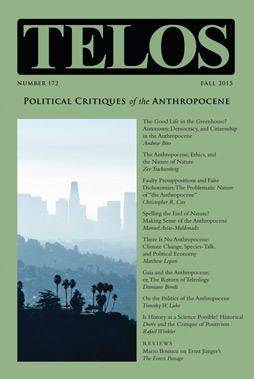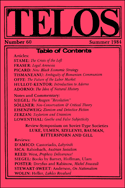In today’s episode of the Telos Press Podcast, David Pan talks with David A. Westbrook about his article “Social Capitalism: A Descriptive Sketch,” from Telos 194 (Spring 2021). An excerpt of the article appears here, and we are providing free open access to the full article at the Telos Online website. To learn how your university can subscribe to Telos, visit our library recommendation page. Print copies of Telos 194 are available for purchase in our online store.
|
The following essay originally appeared in Valeurs actuelles on April 2, 2020, and is published here in English translation by permission of the author. Translated by Russell A. Berman.
It has already been said but it is worth repeating: the health crisis is ringing (provisionally?) the death knell of globalization and the hegemonic ideology of progress. To be sure, the major epidemics of antiquity and the Middle Ages did not need globalization in order to produce tens of millions of dead, but it is clear that the generalization of transportation, exchanges, and communications in the contemporary world could only aggravate matters. In the “open society,” the virus is very conformist: it acts like everyone else, it circulates—and now we are no longer circulating. In other words, we are breaking with the principle of the free movement of people, goods, and capital that was summed up in the slogan “laissez faire,” i.e., let it go, let it pass. This is not the end of the world, but it is the end of a world. With the publication of “The Crisis of Western Societies” (1982), Cornelius Castoriadis returns to an early theme in his work by proposing that over the previous twenty years Western societies had begun to enter a new phase, one that could be considered to be a situation of crisis. In his earlier political thought—associated with Socialisme ou Barbarie—Castoriadis identified signs of a transition into this new phase, marked by a widespread bureaucratization of political decision-making that emerged alongside a general turn toward the privatization of social life. At the time of his revisitation of this theme, Castoriadis’s work had undergone what would be the first of two ontological turns: a turn that involved a radical rethinking of historicity, which understood the historical dimension of society as a socially contingent mode of creation that is central to the constitution of the world of a given society. This article reflects an articulation of his previous theme of crisis with regard to this broader rethinking of historicity throughout the 1970s, which extended political analysis into more foundational issues of social institution and cultural expression. It seems that a young internet highflier who calls himself “the Argonaut,” whose idée fixe is the future of the European Union, has become the champion of a possible Federalist European Union and is bombarding the network with a number of miracles that, according to him, are being achieved in Brussels and Strasbourg. He claims that Europe’s political unification is fully realized, that the ECB has extended quantitative easing to all European banks, that the Greek problem, he happily announces, is solved thanks to a giant issue of fifty-year Greek government real estate bonds, which are sending the international financial market agog. The EU Commission, the Argonaut dreams, has decided to support the British suggestion that the EU MPs should work inside various 28 national parliaments, thus integrating the European institutions, and not in Strasbourg; he moreover says that the Frontex Immigrant Agency in Warsaw, duly instructed by Germany, has accepted enthusiastically to coordinate the Mediterranean immigrants distribution among the EU member states who heartedly agree. His most fantastic declaration is that five EU defense ministers of Germany, France, Italy, Spain, and Great Britain, based on articles 28, 42, and 43 of the Lisbon Treaty, have created the EEF, an European Expeditionary Force, which will be based in Sardinia and near Cracow. Special arrangements, he candidly assures the social network, have already been signed with NATO. |
||||
|
Telos Press Publishing · PO Box 811 · Candor, NY 13743 · Phone: 212-228-6479 Privacy Policy · Data Protection Copyright © 2024 Telos Press Publishing · All Rights Reserved |
||||
 History is always open, as everyone knows, and this makes it unpredictable. Yet in certain circumstances, it is easier to see the middle and long term than the near term, as the coronavirus pandemic shows well. For the short term, one surely imagines the worst: saturated health systems, hundreds of thousands, even millions of dead, ruptures of supply chains, riots, chaos, and all that might follow. In reality, we are being carried by a wave and no one knows where it will lead or when it will end. But if one looks further, certain matters become evident.
History is always open, as everyone knows, and this makes it unpredictable. Yet in certain circumstances, it is easier to see the middle and long term than the near term, as the coronavirus pandemic shows well. For the short term, one surely imagines the worst: saturated health systems, hundreds of thousands, even millions of dead, ruptures of supply chains, riots, chaos, and all that might follow. In reality, we are being carried by a wave and no one knows where it will lead or when it will end. But if one looks further, certain matters become evident. 
 In “The Crisis of the Left and New Social Identities” (1984), Federico Stame addresses the problems encountered by left-wing ideologies and political parties, such as the banality of their demands, as well as deeper underlying issues, such as the falling away of the friend-foe nexus in politics. He also provides hope for improvement by invoking the leading role of new social identities in renewing the tradition of the political Left.
In “The Crisis of the Left and New Social Identities” (1984), Federico Stame addresses the problems encountered by left-wing ideologies and political parties, such as the banality of their demands, as well as deeper underlying issues, such as the falling away of the friend-foe nexus in politics. He also provides hope for improvement by invoking the leading role of new social identities in renewing the tradition of the political Left. 






